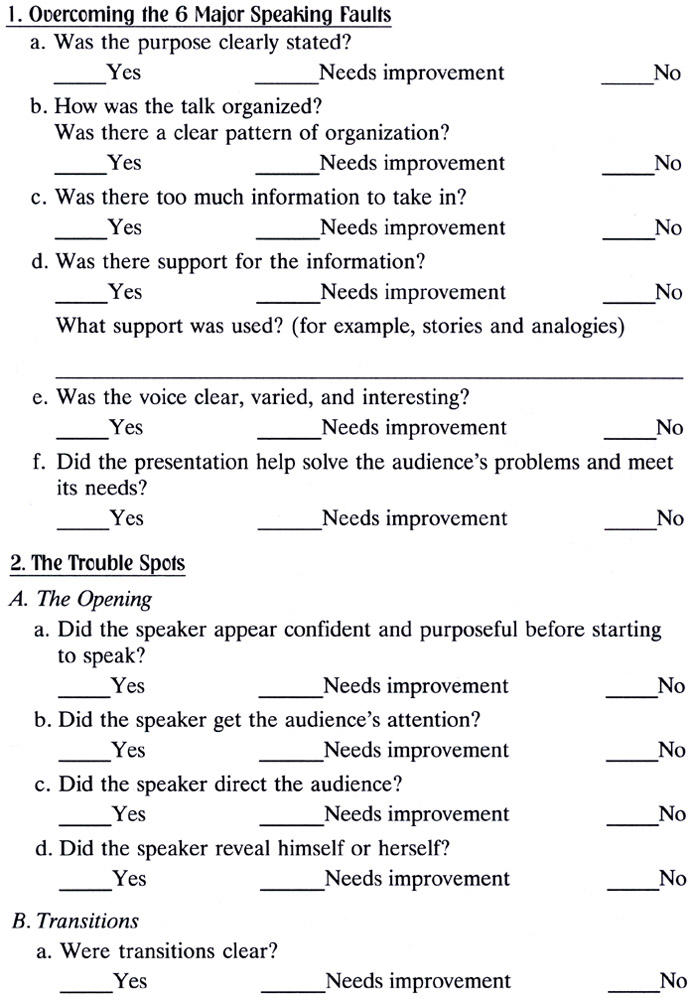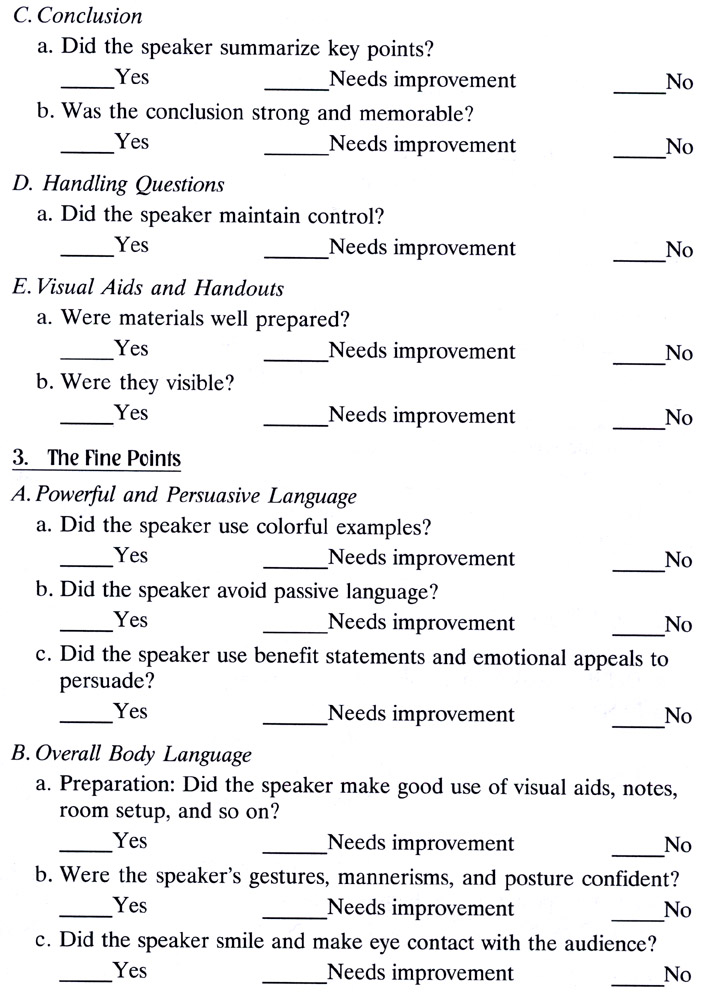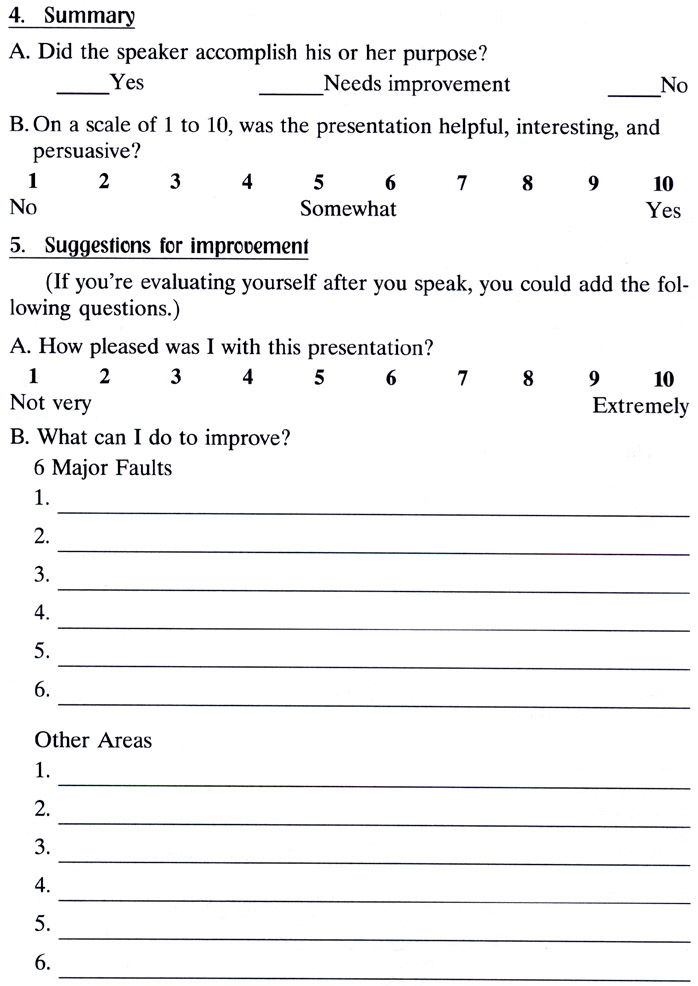Westside Toastmasters is located in Los Angeles and Santa Monica, California
Chapter 23: How to be Your Own Coach
Overview
'0 wud some Pow'r the giftie gie us
To See ourselves as others see us!- Robert Burns
This resource has given you specific skills on how to become a more powerful speaker. But it would not be complete without some way to evaluate your progress, which can be a strangely neglected task. I once attended a gathering of professional speakers. A speech trainer was there to critique those who wanted to be evaluated. Only 10 percent of the speakers wanted this kind of feedback, and I was amazed. Getting criticism is the only way to improve as a speaker, and rarely do speakers get the chance to be judged objectively.
Professionals such as Luciano Pavarotti, Renee Flemming, the Williams Sisters, and Tiger Wood wouldn't dream of advancing through the ranks without some sort of equally professional coaching assistance. So they call upon coaches to give them the criticism and support that lead to improvement.
Speakers - especially the occasional corporate ones - have no such luxury and usually just rely on audience reaction before moving on to the next presentation, which may be months away. But speakers get power only through feedback and criticism. You can be an effective critic for yourself, but only if you go about it constructively. Getting reactions is the first step in becoming your own coach, and this chapter will show you how. You can use the forms at the end to evaluate yourself and others, or you can give other forms to people so that they can evaluate your performance.
Steps to Self-Criticism - Not Self-Destruction
In the public-speaking training courses I give, people look at videotapes of their speeches. When it comes time to give and get feedback, people are twice as hard on themselves as they are on other course members. When I ask what they think are their strengths and weaknesses, they list a long series of weaknesses right off the bat and are often unsure of any strengths.
For self-criticism to work, you have to be gentle with yourself and learn from feedback: If people say you were good, why not believe them? Coaching is criticism, but it is also developing your confidence by ignoring your insecurities and accepting positive comments. You have to be able to pick out critically the good things about your performance, the things you improved since the last speech. Be gentle with yourself and make self-evaluation an uplifting, not a negative, experience. Here are five ways to improve:
Evaluate yourself. Record every speech you give and evaluate each one for presentation style, content, voice, and speech. If you have access to a video camera, you can also assess your gestures, mannerisms, and overall body language. Make a list of the things you did well and improved since your last talk, and list the things you still want to work on. Remember: Be gentle, not brutal.
Have someone else evaluate you. It could be a colleague, your boss, or a friend, depending on the situation. Ask them to be honest and to write down their reactions as you speak. You can use this technique in rehearsals and in the actual presentation.
Provide evaluation forms after each presentation. Pay attention to the evaluations, even if they are painful. Listen to criticism, adapt if it's appropriate, and you will be stronger the next time around. Once I was told my visual aids did not look professional; after that I had them done by a graphic artist and felt much more confident about the entire presentation.
Evaluate other speakers. At the end of this chapter is a form listing some of the criteria speakers are judged by. Use it when you attend presentations, and you'll get a much better sense of where you, too, need improving. You'll also become more aware of exactly where and how other speakers score points, because the form breaks down a speech into its parts and makes evaluation a step-by-step process.
Practice speaking as often as possible. You don't have to wait for corporate presentations to hone your skills. Join a local Toastmasters chapter; volunteer to give speeches to local groups. The only way to reap the benefits of your coaching and to continue to grow is through more speaking.
Keep practicing at meetings and get evaluations there too. At the end of each presentation, large or small, ask yourself what you did well and what you need to improve. Before any presentation, single out one or two things you are going to work on and improve, and note them on confidence cards. Practice those improvements over and over; it takes at least seven dry runs before these changes become a comfortable part of your delivery. Realize you only improve a little at a time - it does not happen all at once.
Self-Coaching Objectives
Coaching has one main objective - to improve every time you speak - that you achieve through a series of smaller ones:
Get feedback from other people.
Be kind to yourself. Try to be truly objective about your performance, which means finding both good and bad aspects.
Don't concentrate only on your weaknesses; keep remembering your strengths.
Don't try to solve too many problems at one time.
Remember that there are major and minor problems. For example, holding a marker during an entire presentation is a minor problem and easily corrected, whereas having too much information in your presentation is major and may take some work to fix.
Work to correct one delivery technique at a time. For example, if you say "uh" a lot, get rid of that habit before working on others.
Content-related faults such as not having a good opening and lacking sufficient transitions can be worked on simultaneously.
Practice self-evaluation regularly; realize it is an ongoing process.
Don't expect too much.
Prioritize the things that are really wrong.
Focus on the six major speaking faults and the trouble spots.
Don't ask your most critical colleagues to criticize you (nor your most supportive).
Build yourself up by thinking of how much you have improved.
Listen to that feedback; if someone compliments you, believe it. That's how self-confidence and positive energy develop.
The only way to grow as a speaker is to keep coaching yourself. Professionals use coaches because excellence is a process; you learn as you go along, you learn from your experience. Because coaching pinpoints both strengths and weaknesses, professional speakers find coaching to be a very important part of the path to speaking with power.
You learn powerful public speaking by having to speak; you also learn it by listening carefully to others. Use the form on page 259 when you hear people speak, and it will help you quickly pinpoint common strengths and weaknesses. You can also adapt it for use as a handout after you speak.
Watch a well-known preacher on television and use a speaker evaluation form to critique him or her.
Make a five-minute motivational talk at your next staff meeting. Pass out evaluation forms after the presentation. Then make a list of the major and minor points you need to improve and an action plan for how you are going to do it.
You can use this form with a variety of audiences to get feedback about your presentations. Vary it according to the type of presentation.







